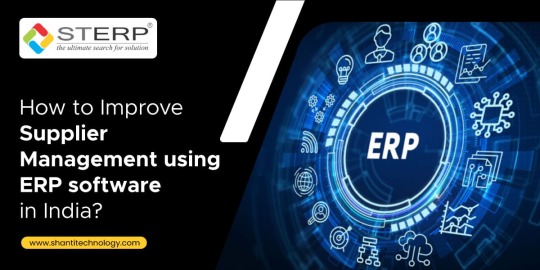#Collaborative Supplier Relationships
Text
Boosting Your Bottom Line: Winning Tactics For Small Businesses
Boosting Your Bottom Line: Winning Tactics For Small Businesses
Small businesses face numerous challenges in today’s competitive market, and one of the most significant obstacles is maintaining a healthy bottom line. Profitability remains an ongoing concern for small business owners who are often juggling multiple responsibilities to keep their enterprises running smoothly.
However, there are…

View On WordPress
#Automation software#budgeting strategies#building trust#Collaborative tools#Contest Marketing#creating emotional connections#Incentive plans#Invoice management#Mentoring programs#Negotiating discounts#Negotiation strategies#networking events#Outsourcing non core functions#Personal branding strategies#Process Optimization#referral programs#Resource allocation#social media#Social media management#Supplier relationship management
0 notes
Text
Big Tech disrupted disruption

If you'd like an essay-formatted version of this post to read or share, here's a link to it on pluralistic.net, my surveillance-free, ad-free, tracker-free blog:
https://pluralistic.net/2024/02/08/permanent-overlords/#republicans-want-to-defund-the-police

Before "disruption" turned into a punchline, it was a genuinely exciting idea. Using technology, we could connect people to one another and allow them to collaborate, share, and cooperate to make great things happen.
It's easy (and valid) to dismiss the "disruption" of Uber, which "disrupted" taxis and transit by losing $31b worth of Saudi royal money in a bid to collapse the world's rival transportation system, while quietly promising its investors that it would someday have pricing power as a monopoly, and would attain profit through price-gouging and wage-theft.
Uber's disruption story was wreathed in bullshit: lies about the "independence" of its drivers, about the imminence of self-driving taxis, about the impact that replacing buses and subways with millions of circling, empty cars would have on traffic congestion. There were and are plenty of problems with traditional taxis and transit, but Uber magnified these problems, under cover of "disrupting" them away.
But there are other feats of high-tech disruption that were and are genuinely transformative – Wikipedia, GNU/Linux, RSS, and more. These disruptive technologies altered the balance of power between powerful institutions and the businesses, communities and individuals they dominated, in ways that have proven both beneficial and durable.
When we speak of commercial disruption today, we usually mean a tech company disrupting a non-tech company. Tinder disrupts singles bars. Netflix disrupts Blockbuster. Airbnb disrupts Marriott.
But the history of "disruption" features far more examples of tech companies disrupting other tech companies: DEC disrupts IBM. Netscape disrupts Microsoft. Google disrupts Yahoo. Nokia disrupts Kodak, sure – but then Apple disrupts Nokia. It's only natural that the businesses most vulnerable to digital disruption are other digital businesses.
And yet…disruption is nowhere to be seen when it comes to the tech sector itself. Five giant companies have been running the show for more than a decade. A couple of these companies (Apple, Microsoft) are Gen-Xers, having been born in the 70s, then there's a couple of Millennials (Amazon, Google), and that one Gen-Z kid (Facebook). Big Tech shows no sign of being disrupted, despite the continuous enshittification of their core products and services. How can this be? Has Big Tech disrupted disruption itself?
That's the contention of "Coopting Disruption," a new paper from two law profs: Mark Lemley (Stanford) and Matthew Wansley (Yeshiva U):
https://papers.ssrn.com/sol3/papers.cfm?abstract_id=4713845
The paper opens with a review of the literature on disruption. Big companies have some major advantages: they've got people and infrastructure they can leverage to bring new products to market more cheaply than startups. They've got existing relationships with suppliers, distributors and customers. People trust them.
Diversified, monopolistic companies are also able to capture "involuntary spillovers": when Google spends money on AI for image recognition, it can improve Google Photos, YouTube, Android, Search, Maps and many other products. A startup with just one product can't capitalize on these spillovers in the same way, so it doesn't have the same incentives to spend big on R&D.
Finally, big companies have access to cheap money. They get better credit terms from lenders, they can float bonds, they can tap the public markets, or just spend their own profits on R&D. They can also afford to take a long view, because they're not tied to VCs whose funds turn over every 5-10 years. Big companies get cheap money, play a long game, pay less to innovate and get more out of innovation.
But those advantages are swamped by the disadvantages of incumbency, all the various curses of bigness. Take Arrow's "replacement effect": new companies that compete with incumbents drive down the incumbents' prices and tempt their customers away. But an incumbent that buys a disruptive new company can just shut it down, and whittle down its ideas to "sustaining innovation" (small improvements to existing products), killing "disruptive innovation" (major changes that make the existing products obsolete).
Arrow's Replacement Effect also comes into play before a new product even exists. An incumbent that allows a rival to do R&D that would eventually disrupt its product is at risk; but if the incumbent buys this pre-product, R&D-heavy startup, it can turn the research to sustaining innovation and defund any disruptive innovation.
Arrow asks us to look at the innovation question from the point of view of the company as a whole. Clayton Christensen's "Innovator's Dilemma" looks at the motivations of individual decision-makers in large, successful companies. These individuals don't want to disrupt their own business, because that will render some part of their own company obsolete (perhaps their own division!). They also don't want to radically change their customers' businesses, because those customers would also face negative effects from disruption.
A startup, by contrast, has no existing successful divisions and no giant customers to safeguard. They have nothing to lose and everything to gain from disruption. Where a large company has no way for individual employees to initiate major changes in corporate strategy, a startup has fewer hops between employees and management. What's more, a startup that rewards an employee's good idea with a stock-grant ties that employee's future finances to the outcome of that idea – while a giant corporation's stock bonuses are only incidentally tied to the ideas of any individual worker.
Big companies are where good ideas go to die. If a big company passes on its employees' cool, disruptive ideas, that's the end of the story for that idea. But even if 100 VCs pass on a startup's cool idea and only one VC funds it, the startup still gets to pursue that idea. In startup land, a good idea gets lots of chances – in a big company, it only gets one.
Given how innately disruptable tech companies are, given how hard it is for big companies to innovate, and given how little innovation we've gotten from Big Tech, how is it that the tech giants haven't been disrupted?
The authors propose a four-step program for the would-be Tech Baron hoping to defend their turf from disruption.
First, gather information about startups that might develop disruptive technologies and steer them away from competing with you, by investing in them or partnering with them.
Second, cut off any would-be competitor's supply of resources they need to develop a disruptive product that challenges your own.
Third, convince the government to pass regulations that big, established companies can comply with but that are business-killing challenges for small competitors.
Finally, buy up any company that resists your steering, succeeds despite your resource war, and escapes the compliance moats of regulation that favors incumbents.
Then: kill those companies.
The authors proceed to show that all four tactics are in play today. Big Tech companies operate their own VC funds, which means they get a look at every promising company in the field, even if they don't want to invest in them. Big Tech companies are also awash in money and their "rival" VCs know it, and so financial VCs and Big Tech collude to fund potential disruptors and then sell them to Big Tech companies as "aqui-hires" that see the disruption neutralized.
On resources, the authors focus on data, and how companies like Facebook have explicit policies of only permitting companies they don't see as potential disruptors to access Facebook data. They reproduce internal Facebook strategy memos that divide potential platform users into "existing competitors, possible future competitors, [or] developers that we have alignment with on business models." These categories allow Facebook to decide which companies are capable of developing disruptive products and which ones aren't. For example, Amazon – which doesn't compete with Facebook – is allowed to access FB data to target shoppers. But Messageme, a startup, was cut off from Facebook as soon as management perceived them as a future rival. Ironically – but unsurprisingly – Facebook spins these policies as pro-privacy, not anti-competitive.
These data policies cast a long shadow. They don't just block existing companies from accessing the data they need to pursue disruptive offerings – they also "send a message" to would-be founders and investors, letting them know that if they try to disrupt a tech giant, they will have their market oxygen cut off before they can draw breath. The only way to build a product that challenges Facebook is as Facebook's partner, under Facebook's direction, with Facebook's veto.
Next, regulation. Starting in 2019, Facebook started publishing full-page newspaper ads calling for regulation. Someone ghost-wrote a Washington Post op-ed under Zuckerberg's byline, arguing the case for more tech regulation. Google, Apple, OpenAI other tech giants have all (selectively) lobbied in favor of many regulations. These rules covered a lot of ground, but they all share a characteristic: complying with them requires huge amounts of money – money that giant tech companies can spare, but potential disruptors lack.
Finally, there's predatory acquisitions. Mark Zuckerberg, working without the benefit of a ghost writer (or in-house counsel to review his statements for actionable intent) has repeatedly confessed to buying companies like Instagram to ensure that they never grow to be competitors. As he told one colleague, "I remember your internal post about how Instagram was our threat and not Google+. You were basically right. The thing about startups though is you can often acquire them.”
All the tech giants are acquisition factories. Every successful Google product, almost without exception, is a product they bought from someone else. By contrast, Google's own internal products typically crash and burn, from G+ to Reader to Google Videos. Apple, meanwhile, buys 90 companies per year – Tim Apple brings home a new company for his shareholders more often than you bring home a bag of groceries for your family. All the Big Tech companies' AI offerings are acquisitions, and Apple has bought more AI companies than any of them.
Big Tech claims to be innovating, but it's really just operationalizing. Any company that threatens to disrupt a tech giant is bought, its products stripped of any really innovative features, and the residue is added to existing products as a "sustaining innovation" – a dot-release feature that has all the innovative disruption of rounding the corners on a new mobile phone.
The authors present three case-studies of tech companies using this four-point strategy to forestall disruption in AI, VR and self-driving cars. I'm not excited about any of these three categories, but it's clear that the tech giants are worried about them, and the authors make a devastating case for these disruptions being disrupted by Big Tech.
What do to about it? If we like (some) disruption, and if Big Tech is enshittifying at speed without facing dethroning-by-disruption, how do we get the dynamism and innovation that gave us the best of tech?
The authors make four suggestions.
First, revive the authorities under existing antitrust law to ban executives from Big Tech companies from serving on the boards of startups. More broadly, kill interlocking boards altogether. Remember, these powers already exist in the lawbooks, so accomplishing this goal means a change in enforcement priorities, not a new act of Congress or rulemaking. What's more, interlocking boards between competing companies are illegal per se, meaning there's no expensive, difficult fact-finding needed to demonstrate that two companies are breaking the law by sharing directors.
Next: create a nondiscrimination policy that requires the largest tech companies that share data with some unaffiliated companies to offer data on the same terms to other companies, except when they are direct competitors. They argue that this rule will keep tech giants from choking off disruptive technologies that make them obsolete (rather than competing with them).
On the subject of regulation and compliance moats, they have less concrete advice. They counsel lawmakers to greet tech giants' demands to be regulated with suspicion, to proceed with caution when they do regulate, and to shape regulation so that it doesn't limit market entry, by keeping in mind the disproportionate burdens regulations put on established giants and small new companies. This is all good advice, but it's more a set of principles than any kind of specific practice, test or procedure.
Finally, they call for increased scrutiny of mergers, including mergers between very large companies and small startups. They argue that existing law (Sec 2 of the Sherman Act and Sec 7 of the Clayton Act) both empower enforcers to block these acquisitions. They admit that the case-law on this is poor, but that just means that enforcers need to start making new case-law.
I like all of these suggestions! We're certainly enjoying a more activist set of regulators, who are more interested in Big Tech, than we've seen in generations.
But they are grossly under-resourced even without giving them additional duties. As Matt Stoller points out, "the DOJ's Antitrust Division has fewer people enforcing anti-monopoly laws in a $24 trillion economy than the Smithsonian Museum has security guards."
https://www.thebignewsletter.com/p/congressional-republicans-to-defund
What's more, Republicans are trying to slash their budgets even further. The American conservative movement has finally located a police force they're eager to defund: the corporate police who defend us all from predatory monopolies.

Image:
Cryteria (modified)
https://commons.wikimedia.org/wiki/File:HAL9000.svg
CC BY 3.0
https://creativecommons.org/licenses/by/3.0/deed.en
#pluralistic#coopting disruption#law and political economy#law#economics#competition#big tech#tech#innovation#acquihires#predatory acquisitions#mergers and acquisitions#disruption#schumpeter#the curse of bigness#clay christensen#josef schumpeter#christensen#enshittiification#business#regulation#scholarship
284 notes
·
View notes
Text
30 Hot Questions: For Wholesale Fashion Secrets for Staying on Trend.
Unlock the world of wholesale fashion with our easy-to-read guide! Discover answers to 30 key questions about clothing categories, reliable suppliers, negotiation tips, and staying stylish in this exciting industry. Whether you’re a seasoned pro or a newbie, this trendy guide has got your back..

Question 1: What are the different types of wholesale clothing available?
Answer: Wholesale fashion secrets surround a wide range of clothing types, from casual wear to formal Clothes. You can explore options like wholesale dresses, wholesale t-shirts, wholesale jeans, and even wholesale accessories to cater to various fashion preferences. Understanding diversity within wholesale fashion is essential to meet needs of your target audience.
Question 2: How can I find wholesale suppliers for clothing?
Answer: Find wholesale fashion secrets starts with huge research. Utilize online directories, attend trade shows, and network within industry to verify reliable wholesale clothing suppliers. Building strong relationships with these suppliers is key to accessing exclusive deals and staying ahead in the fashion game.
Question 3: Are there specific wholesalers for different clothing categories like fashion, sportswear, or workwear?
Answer: Yes, wholesale fashion secrets extend to specialized categories as well. You can find wholesalers specializing in sportswear, workwear, athleisure, and more. Diversifying your inventory with these specific categories can help you cater to a wider audience and tap into niche markets.
Question 4: What is the difference between wholesale clothing and retail clothing?
Answer: Wholesale fashion secrets lie in basic difference between wholesale and retail. Wholesale clothing is typically sold in bulk to businesses at lower prices, allowing for retail resale at a profit. Understanding this pricing model is crucial for successful wholesale fashion proceed.
Question 5: Can you recommend some popular wholesale clothing brands?
Answer: Several renowned wholesale fashion secrets involve collaborating with established brands. Some notable names in the wholesale clothing industry include XYZ Clothing, ABC Fashions, and DEF Apparel. Partnering with such brands can enhance your credibility and attract fashion-conscious customers.
Question 6: How do I determine the quality of wholesale clothing before purchasing?
Answer: Unveiling wholesale fashion secrets related to quality involves requesting samples from potential suppliers. Evaluate the fabric, stitching, and overall craftsmanship to ensure that the clothing meets your standards. Paying attention to quality is essential for building a loyal customer base.
Question 7: Are there any trade shows or events where I can discover new wholesale clothing suppliers?
Answer: Trade shows are treasure troves of wholesale fashion secrets. Events like Fashion Expo and Apparel World offer opportunities to connect with suppliers, witness the latest fashion trends, and unveil new potential partners. Attending such events can open doors to exciting collaborations.
Question 8: What are the advantages of buying wholesale clothing over retail?
Answer: One of the key wholesale fashion secrets is the cost-saving advantage. Purchasing wholesale clothing allows you to secure lower per-unit prices, increasing your profit margins when you sell the items at retail prices. This pricing strategy sets the stage for a lucrative fashion business.
Question 9: How do I negotiate prices with wholesale clothing suppliers?
Answer: Mastering the art of negotiation is crucial for unlocking wholesale fashion secrets. Start by building a strong rapport with your suppliers and discussing long-term partnerships. Express your commitment to bulk orders and inquire about volume-based discounts, helping you secure better deals.
Question 10: Where can I find wholesale clothing online?
Answer: The internet holds a wealth of wholesale fashion secrets waiting to be discovered. Popular online marketplaces like Alibaba, Wholesale Central, and SaleHoo offer extensive catalogs of wholesale clothing options. Explore these platforms to access a wide array of fashion items.
Question 11: Are there any specific requirements or licenses needed to buy wholesale clothing?
Answer: To delve into wholesale fashion secrets legally, you may need a reseller’s permit or a tax ID number, depending on your location. Check with your local authorities to ensure compliance with necessary regulations before embarking on your wholesale clothing journey.
Question 12: What are the best websites for purchasing wholesale clothing in bulk?
Answer: When seeking wholesale fashion secrets online, consider platforms like XYZ Wholesale, ABC Fashion Warehouse, and DEF Clothing Distributors. These websites offer extensive collections, competitive pricing, and user-friendly interfaces for a seamless shopping experience.
Question 13: Can I order samples from wholesale clothing suppliers before making a larger purchase?
Answer: Many suppliers understand the importance of allowing customers to explore wholesale fashion secrets firsthand. You can often request samples to assess quality, fit, and style compatibility with your target audience. Sampling ensures you make informed purchasing decisions.
Question 14: Are there any specific regions or countries known for high-quality wholesale clothing production?
Answer: Wholesale fashion secrets often lead to regions known for their manufacturing prowess. Countries like China, India, and Bangladesh are renowned for producing high-quality clothing at competitive prices. Exploring sourcing options from these regions can be beneficial for your business.
Question 15: How can I ensure that the wholesale clothing I buy is ethically sourced and produced?
Answer: Ethical sourcing is an important aspect of wholesale fashion secrets. Seek suppliers who prioritize ethical practices, such as fair labor conditions and environmentally friendly production. Communicate your values to your audience to build trust in your brand.
Question 16: What are some strategies for selecting the right wholesale clothing supplier for my business?
Answer: Choosing the perfect supplier is one of the critical wholesale fashion secrets. Evaluate factors like pricing, quality, reliability, and customer service. Look for suppliers with a track record of consistency and prompt deliveries to ensure a smooth operation.
Question 17: Are there any restrictions on reselling wholesale clothing from certain suppliers?
Answer: Some wholesale fashion secrets include supplier-specific resale restrictions. It’s essential to review the terms and conditions of your supplier agreements carefully. Some suppliers may have limitations on where and how you can resell their clothing.
Question 18: What are the average lead times for receiving wholesale clothing orders?
Answer: Lead times vary among suppliers and are key wholesale fashion secrets to manage effectively. Communicate with your supplier to understand their delivery schedules. Plan your inventory and marketing accordingly to meet customer expectations.
Question 19: Can I customize wholesale clothing with my own branding or designs?
Answer: Personalization is a valuable wholesale fashion secret. Many suppliers offer customization options, allowing you to add your branding, labels, or even unique designs to clothing items. This helps differentiate your products in a competitive market.
Question 20: Are there any hidden costs associated with buying wholesale clothing?
Answer: Being aware of potential hidden costs is another wholesale fashion secret to keep in mind. Consider factors like shipping fees, import duties, and packaging costs when calculating the total expenses associated with your wholesale clothing orders.
Question 21: Do wholesalers offer discounts for bulk purchases of clothing?
Answer: Wholesale fashion secrets often include volume-based discounts. Suppliers may offer lower prices per unit for larger orders. Take advantage of these discounts to maximize your profit margins.
Question 22: How do I handle returns or exchanges with wholesale clothing suppliers?
Answer: Establish clear return and exchange policies when dealing with wholesale fashion secrets. Communicate these policies with your suppliers to ensure a smooth process in case any issues arise with the clothing you receive.
Question 23: What are the payment terms typically used when buying wholesale clothing?
Answer: Payment terms are integral wholesale fashion secrets to understand. Common terms include 30-day net payment or upfront payment for orders. Negotiate payment terms that align with your cash flow and financial capabilities.
Question 24: How can I stay updated with the latest fashion trends in wholesale clothing?
Answer: Staying in the loop with wholesale fashion secrets requires continuous research and trend analysis. Follow industry publications, attend fashion events, and monitor social media to keep a pulse on the latest trends, ensuring your inventory remains current and appealing.
Question 25: Are there any certification or quality standards I should look for when buying wholesale clothing?
Answer: Wholesale fashion secrets involve quality assurance. Look for certifications like ISO standards or OEKO-TEX certification, which indicate that the clothing meets specific quality and environmental standards. These certifications can reassure your customers about product quality.
Question 26: What are some tips for effectively managing inventory when dealing with wholesale clothing?
Answer: Efficient inventory management is a critical wholesale fashion secret. Implement inventory tracking systems, forecast demand, and maintain a balanced stock level to prevent overstock or stockouts, ensuring you meet customer demands consistently.
Question 27: How can I ensure that the wholesale clothing I purchase meets my customers’ preferences?
Answer: Understanding your target audience’s preferences is a fundamental wholesale fashion secret. Conduct market research, gather feedback, and analyze sales data to curate a clothing collection that resonates with your customers’ tastes and needs.
Question 28: Are there any tools or software that can help streamline the process of buying wholesale clothing?
Answer: Embracing technology is a modern wholesale fashion secret. Utilize inventory management software, e-commerce platforms, and CRM systems to streamline your operations, manage orders efficiently, and enhance customer experiences.
Question 29: Can you recommend some reputable online marketplaces for purchasing wholesale clothing?
Answer: Exploring reputable online marketplaces is a valuable wholesale fashion secret. Platforms like XYZ Marketplace, ABC Wholesale Hub, and DEF Fashion Exchange are known for their diverse range of wholesale clothing options and trusted suppliers.
Question 30: What are the key factors to consider when pricing wholesale clothing for retail resale?
Answer: Pricing is a vital aspect of wholesale fashion secrets. Factors like cost of goods, overhead expenses, competition, and perceived value play a role in setting retail prices. Striking the right balance is essential to ensure profitability while remaining competitive in the market.
Remember that uncovering wholesale fashion secrets requires ongoing learning and adaptability. Stay curious, keep exploring, and embrace these insights to thrive in the dynamic world of wholesale clothing.
2 notes
·
View notes
Text
Charting the Course to SAP HANA Cloud
The push towards SAP HANA cloud shift stems from the need for agility and responsiveness in a dynamic business climate. The cloud promises reduced infrastructure expenses, robust data analytics, and the nimbleness to address changing needs quickly. However, for many companies, transitioning from on-premise SAP HANA to the cloud involves navigating concerns around data security, performance, and potentially relinquishing control of business-critical ERP systems.
SAP HANA Enterprise Cloud: A Tailored Offering
In light of these challenges, SAP presented the SAP HANA Enterprise Cloud (HEC), a private cloud service designed expressly for mission-critical workloads. HEC advertises no compromise on performance, integration, security, failover, or disaster recovery. It spotlights versatility, strong customer support, and end-to-end coverage - from strategic planning to application management. This offering intends to provide the cloud’s agility and innovation under SAP’s direct guidance and expertise.
Actual Delivery of HANA Enterprise Cloud
Despite SAP’s messaging, the HEC’s delivery involves a consortium of third-party providers, including HPE, IBM, CenturyLink, Dimension Data, and Virtustream. SAP collaborates with these partners, who bid on projects often awarded to the lowest bidder, to leverage specialized capabilities while upholding SAP’s standards.
Weighing the Pros and Cons
Partnering with competent vendors ensures clients receive secure, best-practice SAP hosting and support. HEC’s comprehensive solution integrates licensing, infrastructure, and support with touted scalability and integration.
However, several customer challenges emerge. Firstly, leveraging SAP’s brand for cloud hosting and SAP managed services risks diminishing anticipated cost savings. Secondly, the lack of direct engagement with third-party providers raises concerns about entrusting critical ERP operations to unseen partners. This dynamic obscures visibility and control over SAP HANA migration and management.
Furthermore, the absence of a direct relationship between SAP HANA users and cloud suppliers may complicate support, especially for urgent issues warranting rapid response. While SAP’s ecosystem aims to guarantee quality and security, intermediation can hinder the timely resolution of critical situations, affecting system uptime and operations.
SAP HANA Cloud: A Strategic Decision
As SAP systems become increasingly vital, migrating SAP HANA is not simply a technical or operational choice but a strategic one. SAP HANA transcends a database or software suite – it constitutes a competitive advantage that, when optimized, can spur tremendous innovation and success. This migration necessitates meticulous planning, execution, and governance to ensure the transition empowers rather than compromises SAP HANA’s strategic value.
In this context, selecting the ideal cloud model and service providers represents critical decisions. Companies must scrutinize partners beyond cost, evaluating track records, SAP skills, security protocols, and the aptitude to deliver personalized, responsive service.
The Future SAP HANA Cloud Trajectory
As we advance into 2024, the SAP DATA Cloud Analytics landscape continues evolving. Innovations in cloud technology, security, and service creation provide new prospects for migration planning. Firms must stay updated on cloud service advancements, SAP’s strategic direction, and cloud shift best practices to navigate this transition successfully.
To accomplish this, companies should:
Collaborate cross-functionally to align SAP HANA cloud plans with broader business goals and technology roadmaps.
Ensure chosen cloud environments and suppliers meet rigorous data security, privacy, and regulatory standards.
Assess infrastructure ability to support SAP HANA performance requirements and scale amid fluctuating demands.
Institute clear governance and support structures for effective issue resolution throughout and post-migration.
Transitioning SAP HANA to the cloud is complex but ultimately rewarding, unlocking efficiency, agility, and innovation when executed deliberately. By weighing the strategic, operational, and technical dynamics, businesses can drive this migration smoothly, fully capturing SAP HANA’s power to fuel future prosperity.
2 notes
·
View notes
Text
Best Print on Demand Company in Delhi, India
In the dynamic world of e-commerce, Print on Demand (POD) services have gained immense popularity, enabling businesses and individuals to create and sell custom-designed products without the burden of inventory management.

In the bustling city of Delhi, India, numerous POD companies compete for attention, but one stands out as the epitome of excellence in this industry.
SGK Printers : Redefining Print on Demand in Delhi
SGK Printers, headquartered in the heart of Delhi, has emerged as the go-to Print on Demand company for individuals and businesses seeking top-notch quality, prompt services, and a vast array of customizable products.

With a commitment to innovation and customer satisfaction, SGK Printers has carved a niche for itself in the competitive market.
Product Range and Customization:
SGK Printers offers an extensive range of products for customization, including apparel, accessories, home decor, and promotional items. From T-shirts and hoodies to mugs and phone cases, customers can personalize their products with ease. The company’s advanced printing technology ensures vibrant colors, sharp details, and durable prints that meet the highest industry standards.

The user-friendly online design tool provided by SGK Printers empowers customers to unleash their creativity. Whether designing for personal use or creating merchandise for a business, the platform offers a seamless and intuitive experience. The company’s commitment to customization extends beyond just products; it includes packaging options, ensuring that every order reflects the unique identity of the customer.
Quality Assurance:
SGK Printers places a strong emphasis on quality assurance, utilizing state-of-the-art printing technology and premium materials. The company collaborates with reputed suppliers to source high-quality blanks, ensuring that the end product exceeds customer expectations. Rigorous quality checks are conducted at every stage of the production process, from design approval to the final product, guaranteeing a flawless finish.

Fast Turnaround Time:
Recognizing the importance of timely delivery, SGK Printers has optimized its production processes to offer one of the fastest turnaround times in the industry. The company understands the urgency associated with certain orders, especially for events, promotions, or special occasions. SGK Printers’s commitment to efficiency ensures that customers receive their customized products without compromising on quality, even with tight deadlines.

Competitive Pricing and Transparent Costs:
SGK Printers remains competitive in the market by offering transparent pricing and cost-effective solutions. The company believes in building long-term relationships with its customers, and this commitment is reflected in its pricing strategy. With no hidden costs and a range of affordable options, SGK Printers ensures that its services are accessible to individuals and businesses of all sizes.

Customer Support:
A standout feature of SGK Printers is its dedicated customer support team. Understanding that excellent service extends beyond the transaction, the company provides prompt and responsive support to address any queries or concerns. Whether it’s assistance with the design tool, tracking an order, or resolving issues, SGK Printers ensures a positive and reliable customer experience.

Eco-Friendly Practices:
In an era where environmental sustainability is a growing concern, SGK Printers takes pride in its eco-friendly practices. The company is committed to minimizing its environmental impact by using eco-friendly inks, recyclable packaging, and sustainable sourcing practices. SGK Printers strives to strike a balance between providing quality products and preserving the planet for future generations.

Customer Testimonials:
The success of SGK Printers is best reflected in the positive feedback from its satisfied customers. Testimonials highlight the company’s commitment to quality, efficiency, and exceptional customer service. Many customers commend SGK Printers for turning their creative visions into tangible, high-quality products that exceed expectations.

Conclusion:
SGK Printers stands as the unrivaled leader in the Print on Demand industry in Delhi, India. With a comprehensive range of customizable products, top-notch quality assurance, swift turnaround times, competitive pricing, and a dedication to customer satisfaction, SGK Printers has set a new standard for excellence in the industry.

As businesses and individuals continue to seek personalized and unique products, SGK Printers remains the trusted partner, empowering creativity and delivering outstanding results.
#3d printing#3d sign#3d signage#signage#branding#digital art#digital painting#poster#print on demand
2 notes
·
View notes
Text
How to Improve Supplier Management using ERP software in India
Introduction:
In today's highly competitive business landscape, effective supplier management plays a crucial role in the success of manufacturing companies in India. Managing suppliers efficiently can significantly impact the overall productivity, cost-effectiveness, and customer satisfaction of a business. Thankfully, advancements in technology have introduced powerful solutions like Enterprise Resource Planning (ERP) software, which can revolutionize supplier management. In this blog, we will explore the benefits of utilizing ERP software and how it can enhance supplier management for manufacturing companies in India.

Understanding ERP Software:
ERP software integrates various business processes, including finance, inventory management, production planning, and supplier management, into a centralized system. This integration eliminates silos and provides real-time visibility into every aspect of the supply chain, enabling companies to make informed decisions quickly. ERP software acts as a comprehensive tool to streamline operations, enhance efficiency, and improve collaboration with suppliers.
Benefits of ERP Software for Supplier Management:
Streamlined Procurement Process:
ERP software simplifies the procurement process by automating tasks such as supplier selection, purchase order generation, and tracking. It centralizes supplier information, including contact details, performance metrics, and transaction history, making it easier to manage supplier relationships. This streamlining of procurement activities leads to better communication, reduced errors, and faster response times.
Improved Supplier Performance Monitoring:
By utilizing ERP software, manufacturing companies in India can monitor supplier performance more effectively. Key performance indicators (KPIs) such as delivery time, quality, and compliance can be tracked in real-time. This allows businesses to identify underperforming suppliers and take necessary actions, such as renegotiating contracts or seeking alternative options. Timely identification of issues ensures smoother operations and enhances customer satisfaction.
Enhanced Inventory Management:
ERP software provides accurate inventory tracking and forecasting capabilities, enabling companies to maintain optimal inventory levels. By integrating supplier data, businesses can automate replenishment processes, reducing stock-outs and excess inventory. Additionally, ERP software helps in analyzing supplier lead times and identifying potential delays, minimizing production disruptions and ensuring timely deliveries.
Efficient Communication and Collaboration:
Successful supplier management relies on seamless communication and collaboration between manufacturers and suppliers. ERP software facilitates efficient communication channels, enabling secure and real-time information exchange. It offers features like automated notifications, instant messaging, and document sharing, fostering transparency and improving collaboration with suppliers. This streamlined communication ensures that all parties are aligned, reducing misunderstandings and delays.
Choosing the Right ERP Software Provider in India:
When considering ERP software for supplier management, it is essential to select a reliable and experienced provider. Several ERP software providers in India cater specifically to the needs of manufacturing companies. Some popular options include SAP, Oracle, Microsoft Dynamics, and Tally ERP. Before finalizing a provider, businesses should evaluate their requirements, budget, scalability, and support services to ensure a seamless implementation and ongoing assistance.

Conclusion:
In the fast-paced manufacturing industry of India, effective supplier management is a key differentiator for success. Leveraging ERP software can significantly enhance supplier management processes, optimizing procurement, improving supplier performance monitoring, and fostering collaboration. By implementing an appropriate ERP solution from reliable providers in India, manufacturing companies can streamline operations, reduce costs, and gain a competitive edge in the market.
Remember, ERP software is not a one-size-fits-all solution. It is crucial to conduct a thorough evaluation of your company's requirements and choose the ERP system that best aligns with your specific business needs. With the right ERP software in place, manufacturing companies in India can unlock new levels of efficiency, profitability, and growth in their supplier management processes.
#ERP software providers in India#ERP for manufacturing company in India#ERP software Companies in Ahmedabad#ERP solution providers in Ahmedabad#ERP software in Ahmedabad#ERP software providers in Surat#ERP software in Surat#ERP solution providers in Surat#ERP software company in Surat#ERP software Companies in Gujarat#ERP solution providers in Gujarat#ERP for manufacturing company in Gujarat#manufacturer#business process#STERP#shantitechnology
8 notes
·
View notes
Text
Nofeck ITsolutions: Leading Edge Technology in the Digital World
Nofeck ITsolutions is a shining example of excellence in the quick-paced world of technology,
where every second counts and creativity is the secret to success.
We are excited to share our experience with you as we consider our journey thus far and look forward to what is ahead.
A dedication to excellence
The goal of Nofeck ITsolutions' founding was to completely transform how companies operate in the digital sphere.
We have developed over time from a promising startup to a major force in the IT solutions market.
Our company's culture is infused with a strong commitment to perfection,
which motivates us to provide our esteemed clients with unmatched services.
All-inclusive IT Solutions: Nofeck ITsolutions is aware that no two companies are the same.
For this reason, each client's specific needs are taken into account when designing our portfolio of services.
We are your one-stop shop for a broad range of IT services,
from managing IT solutions to web development, SAAS & PAAS, custom software development, cybersecurity, and more.
dependable alliances
Our path has been characterized by tactical partnerships with prominent figures in the sector.
We are proud of the relationships we have with Wazzup, Bitrex24 CRM, Send Plus, HR One, and Data Knowl.
We are able to provide innovative solutions and remain at the forefront of technical breakthroughs because of these collaborations.
Fundamental Innovation:
For us, innovation is more than simply a catchphrase; it's what drives us.
By embracing cutting-edge technologies like artificial intelligence (AI) for business automation and full-stack product development,
we invest in staying ahead of the curve. Nofeck ITsolutions is a partner in your digital transformation process, not merely a supplier of services.
Client-Centered Method:
The success of our clients is entwined with our own. We adopt a client-centric approach,
taking into account your particular objectives and challenges. Our top goal is your satisfaction,
and we take great pride in establishing enduring bonds with our clients that go beyond business dealings.
Gazing Forward:
Nofeck ITsolutions is well-positioned to achieve even more as we move forward.
We are eager to explore the opportunities that lie ahead and are dedicated to pushing the envelope of innovation,
offering unmatched services, and being a reliable ally on your journey to success.
Come Along for the Ride:
We welcome you to embark with us on this thrilling journey, regardless of whether you are a seasoned partner
or are learning about Nofeck ITsolutions for the first time. Keep up with our news, interact with us on social media,
and let's create, expand, and thrive as a team.
The future is here at Nofeck ITsolutions, and we're prepared to help shape it. We appreciate you being a part of our journey,
and we look forward to the upcoming phase of innovation and success.
📈 Contact Us:
🌐 Website: https://www.nofeck.com/
📧 Email: [email protected]
📞 Phone: +91 6374728113
#NofeckITsolutions #InnovationUnleashed #DigitalTransformation #TechInnovators
2 notes
·
View notes
Text
Wholesale Herb Suppliers Near Me: Navigating the Green Wave with Expert Botanicals

In the rapidly growing world of herbal products and supplements, finding reliable wholesale herb suppliers near me is essential for businesses looking to offer quality botanicals to their customers. As consumers increasingly seek natural alternatives, the demand for herbs has surged, creating an opportunity for retailers to capitalize on this trend. In this landscape, Expert Botanicals emerges as a trustworthy partner, delivering premium herbs to businesses seeking excellence in their product offerings.
The Importance of Reliable Wholesale Herb Suppliers
For retailers and businesses in the herbal industry, the proximity of their wholesale herb supplier plays a crucial role in ensuring timely and efficient operations. Having wholesale herb suppliers near me is not just a matter of convenience; it allows for quicker deliveries, reduces shipping costs, and fosters a closer relationship between the supplier and the business.
Expert Botanicals: Your Trusted Partner in Herbal Excellence
Enter Expert Botanicals, a name synonymous with quality and reliability in the world of herbal products. As a leading supplier, Expert Botanicals caters to the needs of businesses seeking exceptional herbs sourced from the finest botanicals. Their commitment to excellence extends to providing businesses with a local touch, with distribution centers strategically positioned to serve as wholesale herb suppliers near me.
Premium Quality, Locally Accessible
One of the key advantages of choosing Expert Botanicals as your wholesale herb supplier near me is the uncompromising commitment to quality. With rigorous quality control measures in place, Expert Botanicals ensures that businesses receive premium-grade herbs that meet the highest industry standards. This commitment to quality translates into products that customers trust and businesses can confidently offer to their clientele.
Efficiency in Operations
Timeliness is of the essence in the retail industry, and having a local supplier contributes significantly to operational efficiency. Expert Botanicals understands the importance of streamlined operations and strives to be the go-to wholesale herb supplier near me for businesses. Their distribution centers are strategically located to ensure prompt deliveries, reducing lead times and keeping businesses ahead of the competition.
A Diverse Range of Herbal Offerings
Expert Botanicals doesn't just offer proximity; they boast an extensive range of herbs that cater to diverse customer preferences. From popular choices like Kratom and CBD to a wide array of botanical extracts, their product portfolio reflects the evolving demands of the herbal market. This variety empowers businesses to curate a product selection that aligns with their unique brand positioning and target audience.
Building Long-Term Partnerships
Expert Botanicals goes beyond being a mere supplier; they strive to be a partner in the success of their clients. By positioning themselves as wholesale herb suppliers near me, they foster relationships with businesses, understanding their needs and working collaboratively to ensure mutual growth. This commitment to partnership sets Expert Botanicals apart as a trusted ally in the competitive herbal industry.
Conclusion: Elevate Your Business with Expert BotanicalsIn conclusion, the search for reliable wholesale herb suppliers near me ends with Expert Botanicals. Their dedication to quality, efficiency, and building lasting partnerships makes them the ideal choice for businesses looking to thrive in the herbal market. As the herbal industry continues to flourish, partnering with Expert Botanicals ensures that your business stays at the forefront of this green wave, delivering excellence to your customers.
2 notes
·
View notes
Text
Unveiling the Strategic Impact: Understanding the Uses of Learning SAP MM Course at SAP Training Institute
In the realm of enterprise resource planning (ERP), SAP MM (Materials Management) stands as a critical module that plays a pivotal role in managing an organization's materials, procurement processes, and inventory. The SAP Training Institute offers a comprehensive SAP MM course designed to equip professionals with the skills necessary to harness the full potential of this module. In this exploration, we will uncover the multifaceted uses and strategic implications of learning SAP MM at the SAP Training Institute.
USES OF LEARNING SAP MM COURSE AT STUDY GIANT ACADEMY
Efficient Materials Management
At the core of SAP MM lies the ability to streamline materials management processes. Professionals undergoing SAP MM training gain insights into the efficient handling of procurement, inventory management, and logistics, ensuring that an organization's resources are optimally utilized.
Optimized Procurement Processes
Learning SAP MM empowers individuals to navigate the complexities of procurement. From the creation of purchase requisitions to vendor evaluation, the course covers the end-to-end procurement cycle. This knowledge is invaluable in enhancing the efficiency of procurement processes and reducing costs through effective supplier management.
Inventory Control and Visibility
The SAP MM course at the institute delves into the intricacies of inventory management. Participants learn how to maintain optimal stock levels, track goods movements, and implement inventory control measures. This not only prevents stockouts but also minimizes excess inventory, contributing to cost savings.
Integration with Other SAP Modules
SAP MM does not operate in isolation; it integrates seamlessly with other SAP modules such as SAP SD (Sales and Distribution) and SAP PP (Production Planning). Understanding these integration points is a key focus of the training, providing participants with a holistic understanding of how materials management intersects with other business processes.
Vendor Relationship Management
Effective vendor management is crucial for organizational success. SAP MM training equips professionals with the skills to manage vendor relationships efficiently. From vendor selection to performance evaluation, participants gain insights into fostering collaborative and mutually beneficial partnerships.
Compliance and Documentation
In the ever-evolving landscape of regulations and compliance, the SAP MM course emphasizes the importance of adhering to industry standards. Participants learn how to generate accurate and compliant documentation, ensuring that the organization meets regulatory requirements and operates ethically.
Cost Savings through Strategic Sourcing
Strategic sourcing is a key aspect of SAP MM, and the training program focuses on enabling professionals to make informed decisions in the procurement process. This includes identifying cost-effective sourcing strategies, negotiating favorable terms, and ultimately contributing to substantial cost savings for the organization.
Real-Time Reporting and Analytics
SAP MM training goes beyond transactional processes and delves into the realm of reporting and analytics. Participants learn how to generate real-time reports on materials usage, procurement trends, and inventory turnover. This data-driven approach empowers organizations to make informed decisions for future planning.
Career Advancement Opportunities
Completion of the SAP MM course from the SAP Training Institute is not just a skill acquisition; it opens doors to new career opportunities. Professionals equipped with SAP MM expertise are sought after by organizations across industries, positioning graduates for roles such as SAP MM consultant, materials manager, or procurement specialist.
Continuous Learning and Updates
The SAP MM course is designed to foster continuous learning. With regular updates on the latest features and functionalities of SAP MM, participants stay abreast of industry advancements. This commitment to ongoing education ensures that professionals remain valuable assets to their organizations.
WHY DO YOU JOIN STUDY GIANT ACADEMY ?
Learning SAP MM Course at Study Giant SAP Training Institute is an investment in acquiring skills that extend beyond the confines of materials management. The strategic uses of SAP MM span procurement, inventory control, vendor management, and compliance, positioning professionals as strategic assets in their organizations. As businesses increasingly rely on SAP solutions for efficient materials handling, professionals equipped with SAP MM expertise are well-prepared to contribute to organizational success and navigate the intricacies of modern supply chain management.
Study Giant Academy is not just a training institution; it's a hub for transformative experiences. Whether you're starting your SAP journey or looking to upskill, we invite you to be a part of our thriving community. Unleash the power of SAP, embrace digital transformation, and redefine what's possible in your career.
Embark on this journey with us, and let Study giant Academy be your guide to unlocking the potential within you. Here's to many more years of empowering careers and shaping the future of digital excellence!
2 notes
·
View notes
Text

SAP Ariba Supplier offers digital commerce solutions and Ariba Network to connect over 3.4 million companies in 190 countries, helping buyers and suppliers discover new opportunities, collaborate on transactions, and grow relationships, thereby enhancing business operations.
2 notes
·
View notes
Text
Long gone are the days when I didn’t research my favorite celebrities. One such favorite was Emma Watson, who was announced as the new muse and ambassador for Prada on August 18th, after asking on their Instagram stories ‘’who is she?’’ as if we didn’t see her the last 20 years, she is not a newbie.
My first thought was ‘’wait, Prada was rated by Goodonyouapp as Not Good Enough, so the perfume must be shady as well’’ and I was right. Prada’s fragrances are not cruelty-free, not even the latest release called Paradoxe, as in they could be tested on animals such as bunnies whether directly by the brand or indirectly by suppliers or third-party, they even sell in mainland China, where such tests are still required by law.
Emma Watson and Prada wanted to come across as sustainable in the new behind the scenes video. Yet, only the 100ml bottle of the perfume is refillable. Ethically all available 30 and 50ml bottles should also be refillable in Prada stores. They failed to explain what exactly is sustainable about Emma’s self-image campaign advert, which barely featured the perfume(Paradoxe) she was expected to sell/promote.
Three photos of Emma leaked already, which is surprising to me, even the behind the scenes video was not posted by official accounts which showed lack of professionalism handling the campaign. Emma Watson did fire her Prosper PR team after she received backlash over black squares posted on her Instagram account. She must have thought she has the last word when she posted black squares recently, on the same Instagram account.
All so called luxury brands want to be perceived as sophisticated, expensive, yet testing on animals is an unnecessary practice, they could have easily said a firm ‘’NO’’ to selling their products where such practices are still required, but one can guess business and profits are above the ‘’do not harm’’ principle. If they wanted to be sustainable they would have taken action in that direction. This is another example of greenwashing enabled by celebrity hype. Is it really luxury if animals are slaughtered for a perfume?
Emma herself is not an (eco)activist as she flew during the pandemic for leisure, feminist(slut-shamed women at 17 and was named in the Panama Papers with an off-shore company among many other unethical things) or anything close to sustainable(she is mostly papped shopping for fast fashion for which there’s plenty of photographic evidence, never for a book, music or art supplies).
I wonder what happened to ”we have so much power to change the world just by being careful in what we buy”(February 2019 on Goodonyou) and ”I have committed to only purchasing and wearing brands that are rated ‘It’s A Start’ or above, as I want to be able to support brands moving in the right direction.”(Vogue UK 2020) as most of her sartorial choices were rated Not Good Enough by the same company she endorsed(search a brand here).
Lack of a PR team means that news of her relationship with Brandon Green(son of Arcadia Group owner P. Green) overshadowed the news of her Prada collaboration, this relationship alone shows where her priorities are. A paradox – so the name of the fragrance fits Emma like a glove. She even has a diva reputation for being rude, dismissive to fans as young as 6 years old, to journalists since she was 11, to everyone from film crews, film extras, restaurant and festival staff to her own drivers to whom she had a tendency to yell at, a snob in public(from people who met her in Oxford, Headington School, Oxford Uni, Brown Uni, HP premieres, out and about etc.).
She clearly chose prestige and money over values. The Female Lead was right to advise young people to choose a role model carefully because Emma is clearly the opposite of one. Her image was built by her former PR teams and perpetuated by the media(which we know is an illusion). I’m not falling for greenwashing enabled by celebrity hype anymore. Thanks to the internet for enabling me to get better informed!
---
Okay, serious question: Does this person read Sam or my blog? Or do they just do their own research, because everything this person says has been mentioned on this blog.
They're being pretty harsh, but they're not exactly wrong. They're right in saying that the ad focused more on her than on the perfume. And then there's the fact that the perfume isn't cruelty free! The bottle being refillable doesn't really seem that great after learning this.
And is it true that the 30ml and 50ml bottles can't be refilled? I just thought that people could just buy the 100ml bottle and fill them gradually.
24 notes
·
View notes
Note
this early contact rumour for a mchonda reunion is very interesting.
it's all very early stages but it's good to know that the new management at the head of both parties are open to collaboration.
the intriguing part to me (while not mentioned in the article) is how james key is now the head technical guy at mcl, and the fact that key was absolutely vital in getting honda back on the right track with alphatauri/toro rosso.
if that key-honda relationship is still there (which was supposedly very good), it might be something to get a tiny bit excited about ... !
It’s a long way off, but there is a part of me that would kill for McLaren team works engine deal.
Although the McHonda days were a time to say the least, so if it does happen, I hope it’s not a repeat of that 
In general, I would love just to see Honda stick around as an engine supplier; purely so that there’s more variety of engine manufacturers on the grid 
9 notes
·
View notes
Text
Achieving Cost Savings through Supplier Collaboration in Siemens Teamcenter PLM Software
In the dynamic landscape of modern business, collaboration is the cornerstone of success. This holds true not only within an organization but also across the entire supply chain. Suppliers play a pivotal role in the journey from concept to creation, and their collaboration can yield significant cost savings and operational efficiencies. Teamcenter PLM's supplier collaboration features are transforming the way organizations interact with suppliers, leading to negotiated cost savings, improved procurement processes, and enhanced cost control. In this article, we delve into how Teamcenter PLM is fostering this collaborative spirit, backed by real-world examples.

A New Paradigm in Supplier Collaboration
Gone are the days of transactional relationships between organizations and suppliers. The modern approach is based on collaboration, where suppliers are viewed as strategic partners integral to the success of a project. Siemens PLM Software, with its comprehensive suite of supplier collaboration tools, empowers organizations to seamlessly integrate suppliers into their product development processes.
Negotiated Cost Savings: A Win-Win Scenario
Supplier collaboration in Teamcenter PLM opens the door to negotiated cost savings. When suppliers are brought into the design phase, they can offer valuable insights into cost-effective materials, manufacturing processes, and alternative components. By tapping into their expertise, organizations can optimize designs for cost efficiency without compromising on quality. For instance, a manufacturer collaborating with a supplier might identify a more cost-effective yet equally durable material for a component, resulting in substantial cost savings over the product's lifecycle.
Improved Procurement Processes: Streamlining Efficiency
Procurement is a critical component of the supply chain, and any inefficiencies can lead to increased costs. Teamcenter PLM's Cost Management Software supplier collaboration features streamline procurement processes by providing real-time visibility into supplier capabilities, capacities, and lead times. This enables organizations to make informed decisions about sourcing, reducing the risk of delays and costly last-minute changes. For instance, a company collaborating with a supplier can receive updates on raw material availability, helping them plan their production schedule and avoid costly supply shortages.
Enhanced Cost Control: Data-Driven Insights
Effective cost control requires accurate and up-to-date information. Teamcenter PLM's supplier collaboration features enable organizations to access real-time cost data from suppliers. This transparency empowers procurement teams to make strategic decisions based on actual costs rather than estimates. Furthermore, collaboration with suppliers can help organizations identify cost drivers and areas where cost reductions can be implemented. For instance, a company working closely with a supplier might discover opportunities to consolidate shipments, reducing transportation costs.
Real-World Examples of Success
Real-world examples illustrate the power of supplier collaboration in achieving cost savings. Consider a consumer electronics company partnering with a supplier to design a new smartphone. By collaborating closely, they identify a more cost-effective battery design that doesn't compromise on performance. This leads to reduced manufacturing costs and a competitive edge in the market.
In the automotive industry, a car manufacturer collaborates with a supplier of advanced materials. Together, they explore innovative materials that are not only lightweight but also cost-efficient. This collaboration results in cost savings due to reduced material consumption and improved fuel efficiency in the final product.
Conclusion: Empowering Future Success
Supplier collaboration through Teamcenter PLM software transcends traditional boundaries. It's a strategy that fosters innovation, efficiency, and cost savings. By involving suppliers early in the product development process, organizations can tap into their expertise, optimize designs, and make informed decisions that positively impact the bottom line. As the business landscape continues to evolve, organizations that embrace supplier collaboration are not only achieving cost savings but also laying the foundation for future success and growth.
For Free PLM Software trial, download Siemens Teamcenter PLM software trial!
#plmsoftware#costmanagementsoftware#what is plm software#plm software#siemens plm software#cost reduction software#free plm software
2 notes
·
View notes
Text
7 Skills to Become Proficient in Logistics: Everything You Need To Know About
Logistics is essential in ensuring the smooth flow of goods and services throughout enterprises. Logistics competency is critical for optimizing operations, driving cost efficiency, and increasing customer satisfaction. This blog from Larry Savage Jr Birmingham- 7 Skills to Become Proficient in Logistics dig into seven critical abilities in improving your logistics competence.

7 Skills to Become Proficient in Logistics
If you want to become a proficient logistics personnel, here are seven vital skills that you need to acquire first:
1. Supply Chain Management: A good comprehension of supply chain management is a prerequisite for successful careers in logistics. This ability entails managing the transit of commodities, information, and funds from the point of origin to the point of consumption. Good supply chain management necessitates excellent coordination, handling of inventory, and the capacity to improve procedures.
2. Critical Thinking: Daily, logistics personnel face various challenges, including delays, transportation concerns, and inventory anomalies. It is necessary to have strong critical thinking and problem-solving skills to resolve these challenges quickly. Logistics specialists skilled at analyzing complex scenarios, identifying fundamental causes, and developing innovative solutions that reduce interruptions and maintain an uninterrupted flow of commodities across the supply chain are in high demand.
3. Data Analysis and Technology: Data analysis and technology have become essential in logistics in this digital age. Professionals must be prepared to evaluate vast volumes of data, detect patterns, and use technology to enhance logistical procedures. It is critical to be familiar with logistics applications, transportation management infrastructure, and data analytics tools to make educated decisions, improve efficiency, and improve the overall performance of the supply chain.
4. Communication and Collaboration: Effective communication and teamwork skills are essential in logistics. Logistics workers must be able to communicate clearly and concisely with suppliers, vendors, warehouse staff, and delivery partners. They must also be skilled in relationship development and maintenance, contract negotiation, and dispute resolution.
5. Time Management: Time management and organization are vital in the fast-paced logistics business. Professionals must be skilled in prioritizing activities, setting timetables, and managing many projects simultaneously. Shipments are delivered on schedule, inventory is correctly handled, and deadlines are met with effective time management.
6. Financial Acumen: Logistics professionals must know the financial consequences of their decisions and activities. Budgeting, cost analysis, and comprehending key performance indicators are all examples of financial aptitude. Competent individuals can contribute to the company's financial well-being by monitoring spending, discovering cost-saving options, and streamlining logistical procedures.
7. Flexibility: Logistics workers must be agile and versatile in an ever-changing sector. This skill enables employees to adjust promptly to changing marketplace dynamics, technology breakthroughs, and client needs.
If you are starting a supply chain and wondering how you can become one of the market leaders, the blog by Larry Savage Jr — The 3 P’s Formula for Entrepreneurial Success, can guide you to a great extent. You can succeed in the industry while contributing to the seamless development of your business by constantly developing and improving your abilities.
#7 Skills#3 P’s Formula#Entrepreneurial Success#Time Management#Proficient in Logistics#Larry Savage Jr Birmingham#Logistics professionals#Chain Management
5 notes
·
View notes
Text
Benefits of Hiring Professional Shopfitters Perth
In the competitive world of commercial retail, creating an appealing and functional store environment is crucial for attracting customers and maximizing sales. Hiring professional shopfitters for your commercial shop fitouts in Perth can provide numerous advantages. Their expertise, experience, and attention to detail can make a significant difference in the success of your business. In this article, we will explore the key benefits of engaging professional shopfitters in Perth and how they can enhance your commercial space, improve customer experience, and ultimately boost your profitability.
Extensive Expertise and Experience
Professional shopfitters specializing in commercial shop fitouts possess extensive knowledge and expertise in the field of retail design and construction. With years of experience, they have a deep understanding of the latest industry trends, materials, and techniques to transform your commercial space into an attractive and functional environment. Their expertise allows them to handle all aspects of shopfitting, from concept development and space planning to installation and project management.
With their specialized knowledge, professional shopfitters can assess your specific business requirements, analyze your target market, and propose tailored solutions that align with your brand identity. They are well-versed in optimizing traffic flow, strategic product placement, and effective visual merchandising techniques, ensuring an engaging shopping experience that drives sales and customer loyalty.
Customized Commercial Shop Fitouts
One of the primary advantages of hiring professional shopfitters for commercial shop fitouts is their ability to create customized designs that reflect your brand and meet your unique business needs. They work closely with you to understand your vision and requirements, incorporating your input into the design process. Whether you need a modern and sleek retail space or a warm and inviting atmosphere, professional shopfitters can bring your ideas to life.
Using advanced design software, shopfitters create 3D models and visualizations of your commercial space, allowing you to visualize the final outcome before construction begins. This collaborative approach ensures that the end result aligns with your expectations, promotes your brand image, and creates a positive impression on your customers.
Time and Cost Efficiency
Engaging professional shopfitters for your commercial shop fitouts can save you valuable time and money. Their experience and industry connections enable them to source high-quality materials at competitive prices, ensuring cost-effective solutions for your project. They have established relationships with subcontractors and suppliers, streamlining the construction process and minimizing delays.
Professional shopfitters are proficient in project management, adhering to strict timelines and delivering projects on schedule. Their efficient planning and execution help minimize downtime, allowing you to open your commercial space sooner and start generating revenue faster.
Compliance with Regulations and Safety Standards
When it comes to commercial spaces, compliance with building codes and safety standards is essential. Professional shopfitters are well-versed in these regulations and ensure that your commercial shop fitouts meet all legal requirements. They handle the necessary permits, certifications, and inspections, relieving you of the administrative burden and reducing the risk of non-compliance penalties.
Moreover, shopfitters prioritize the safety of both customers and employees during the construction process. They implement proper safety measures, minimize hazards, and adhere to health and safety guidelines, creating a secure environment for everyone.
Conclusion
Hiring professional shopfitters for your commercial shop fitouts offers numerous benefits. Their expertise, experience, and attention to detail result in customized designs that align with your brand identity and maximize the functionality of your space. They save you time and money through efficient project management and industry connections. Moreover, their knowledge of compliance regulations and commitment to safety ensure a legally compliant and secure commercial environment.
Investing in professional shopfitters is a strategic decision for any business looking to enhance their commercial space. By partnering with these experts, you can create an attractive and functional environment that captivates customers, drives sales, and contributes to the success of your business in the competitive retail landscape of Perth.
2 notes
·
View notes
Text
How ERP Software Can Help Manufacturing Companies With Their Supply Chain Management?
ERP software plays a crucial role in Supply Chain Management by providing comprehensive tools for inventory management, order tracking, and logistics optimization, ensuring efficient coordination and streamlined operations across the entire supply chain. It enables real-time data visibility, facilitates effective planning, and enhances collaboration between different stakeholders, resulting in improved customer satisfaction and cost savings.
Introduction:
In today's highly competitive business environment, manufacturing companies face numerous challenges in managing their supply chain effectively. However, with the advancements in technology, specifically Enterprise Resource Planning (ERP) software, manufacturers now have a powerful tool to streamline their operations and optimize their supply chain management. In this blog post, we will explore how ERP software can benefit manufacturing companies, with a specific focus on the vibrant city of Ahmedabad, where several ERP software companies and solution providers can assist businesses in achieving their supply chain goals.

Enhanced Visibility and Planning:
One of the primary advantages of using ERP software in manufacturing is the ability to gain real-time visibility into the entire supply chain. From procurement and inventory management to production planning and order fulfillment, ERP systems provide a comprehensive view of the entire process. Manufacturers in Ahmedabad can benefit from the services of ERP solution providers in Ahmedabad who offer tailored solutions to meet their specific requirements.
Streamlined Inventory Management:
Effective inventory management is critical for manufacturing companies to minimize costs and optimize production. ERP software enables companies to track and manage inventory levels, monitor stock movements, and automatically generate purchase orders based on predefined reorder points. This feature ensures that manufacturers in Ahmedabad always have the right amount of inventory, reducing stockouts and improving customer satisfaction.
Efficient Production Planning and Scheduling:
ERP systems enable manufacturing companies to optimize their production planning and scheduling processes. By integrating various departments such as sales, procurement, and production, ERP software provides accurate demand forecasting, resource allocation, and scheduling capabilities. This integration ensures that manufacturers in Ahmedabad can align their production with customer demands, reduce lead times, and increase operational efficiency.
Effective Supplier Management:
For manufacturing companies, maintaining strong relationships with suppliers is crucial. ERP software allows businesses to centralize supplier information, track performance metrics, and manage supplier contracts effectively. With ERP systems, manufacturers in Ahmedabad can collaborate with their suppliers, streamline communication, and ensure timely deliveries of raw materials, ultimately reducing costs and improving supply chain reliability.
Data-Driven Decision Making:
ERP software provides manufacturers with a wealth of data and analytical tools to make informed decisions. By leveraging the power of data analytics and reporting capabilities, manufacturing companies in Ahmedabad can identify trends, identify bottlenecks, and optimize their supply chain operations. ERP solution providers in Ahmedabad can assist businesses in customizing their ERP systems to generate insightful reports and KPIs tailored to their specific requirements.

Conclusion:
In today's competitive manufacturing landscape, companies in Ahmedabad can greatly benefit from implementing ERP software solutions. ERP software companies and solution providers in Ahmedabad offer comprehensive systems that enable manufacturers to streamline their supply chain management processes, enhance visibility, optimize inventory, improve production planning, manage suppliers effectively, and make data-driven decisions. By leveraging the power of ERP software, manufacturing companies in Ahmedabad can gain a competitive edge, improve operational efficiency, and achieve their supply chain goals effectively.
For more detailed information contact STERP Software Pvt. Ltd.
#ERP software providers in India#ERP for manufacturing company in India#ERP software in India#ERP software Companies in Ahmedabad#ERP solution providers in Ahmedabad#ERP software in Ahmedabad#ERP software providers in Surat#ERP software in Surat#ERP solution providers in Surat#ERP software company in Surat#ERP software Companies in Gujarat#ERP solution providers in Gujarat#ERP for manufacturing company in Gujarat
7 notes
·
View notes